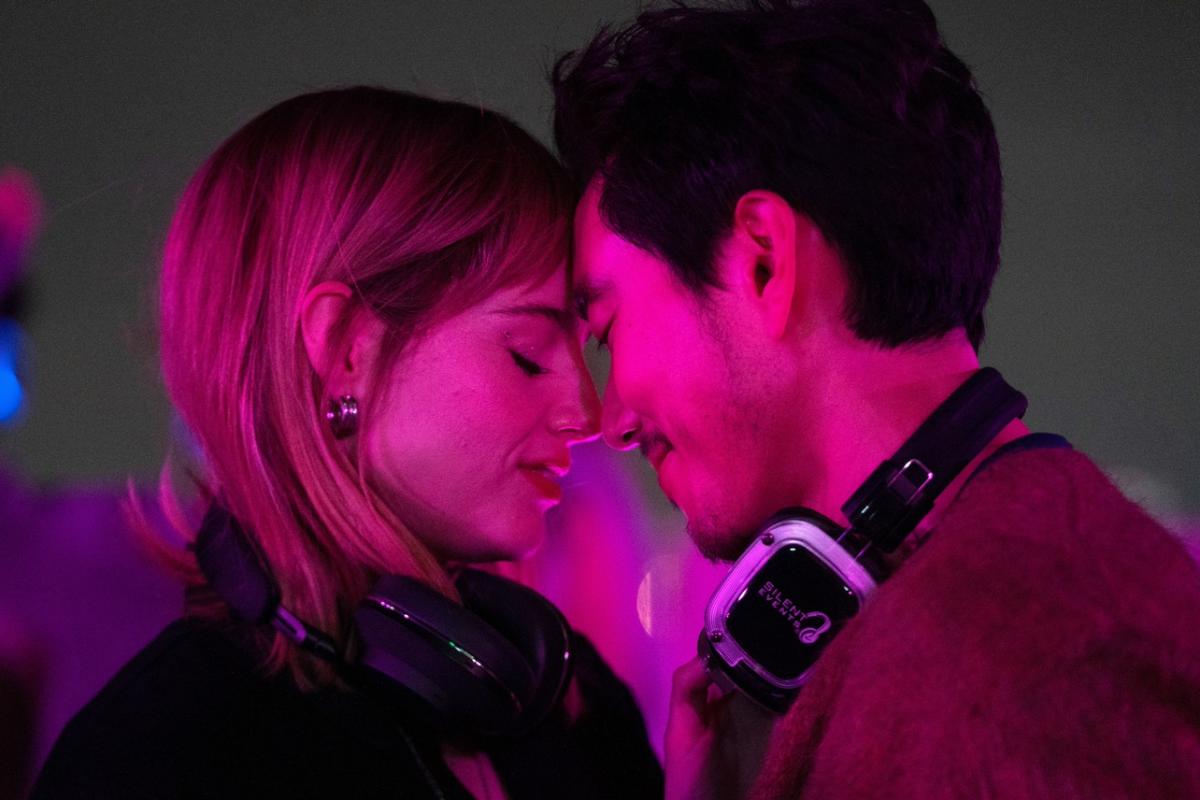The Greatest Hits on Hulu—which began streaming today— is a movie with a fascinating concept. Many of us have experienced a pang of nostalgia or been reminded of a memory when we hear a certain song. The Greatest Hits takes that a step further. What if certain songs could literally pull you back into the past?
That’s the conundrum faced by the protagonist of The Greatest Hits, a woman who finds herself time-traveling into her past to visit her now-dead boyfriend. Written and directed by Ned Benson (The Disappearance of Eleanor Rigby), the movie stars American-English actor Lucy Boynton, who you may know from her roles in 2016’s Sing Street and 2018’s Bohemian Rhapsody.
But though the initial concept of The Greatest Hits is fascinating, the actual execution of the plot is a bit murky. Time travel plots are notoriously confusing, after all. If you got lost along the way, don’t worry: Decider is here to help. Read on for an analysis of The Greatest Hits plot summary and The Greatest Hits ending explained, including what the missing song in The Greatest Hits movie is.
The Greatest Hits movie plot summary:
We meet Harriet (Lucy Boynton) on the two-year anniversary of the death of her boyfriend, Max (David Corenswet). Harriet loves music and worked as a music producer before Max died in a fatal car crash. Since Max’s death, Harriet has discovered that certain songs cause her to literally time travel back to a time in her relationship with Max when they first heard the song together. But no matter how many times Harriet puts on the song that was playing on the day of the car crash, and travels back to that moment, she can’t convince Max to pull over the car to prevent the crash.
Because Harriet can’t control when she might hear a song that pulls her into the past, she wears earplugs and headphones when she’s out in public. She’s also searching for a specific “missing song” that she can’t remember the name of, but she believes it will take her back to the exact right time to prevent the car crash and save Max. Her best friend Morris (Austin Crute) urges her to let go of the past and live in the present, but Harriet can’t… until she meets a new guy named David (Justin H. Min).

Harriet meets David at a grief support group. David recently lost both of his parents. Despite his sister’s pleas to sell, David is determined to keep running his parents’ antique shop as a way to keep their memory alive. When they meet, David is immediately enamored with Harriet and asks her out on a date. They have a nice time, even though David thinks it’s a little weird that Harriet keeps her headphones on the entire time for a “medical condition,” and that she runs out on him when she hears a song that pulls her into the past. Nevertheless, Harriet tries to make the new relationship work.
After David witnesses Harriet pass out from a time-travel spell, she tries to explain her situation. He doesn’t believe her. Later, when David brings Harriet to his parents’ antique shop, she realizes she’s been there before. She rifles through his parents’ old records until she finds an album cover she recognizes, and realizes it’s the “missing song.” She promises David she will be able to prove to him that the time travel is real, and asks him where the best hiding spot in the shop is. He tells her that it’s an old school desk.
What is the missing song in The Greatest Hits movie?
Harriet puts on the song—Mozart’s Fantasia in D Minor—and travels back to a day when she visited the antique shop with Max. It’s the day of the car crash, when Max bought a chair from the antique shop, and it’s the moment when Harriet believes she can save his life. But no matter what Harriet says to Max, she can’t convince him not to buy the chair. She gives up and decides to use her remaining time—the length of the song—writing a note to David. She leaves the note in the school desk, and returns to the present-day. Present-day David finds the note, and finally believes Harriet.
David and Harriet continue to try to have a normal relationship. But after Harriet is thrust into the past yet again—courtesy of that infamous earworm jingle for “Kars 4 Kids”—she realizes she can’t spend the rest of her life this way. So she comes up with a plan.

The Greatest Hits ending explained:
As Harriet explains to David, she can’t seem to change anyone else’s behavior when she time travels—but she can change her own behavior. She decided to travel back to the day she first met Max at a music festival, and make the decision that will cause her to never have a relationship with him. This also means that she might never meet David, too. Before she goes, she and David promise to look for each other in the new timeline.
Harriet travels back in time to the music festival where she first met Max, and this time, she declines to follow him into the crowd. As a result, she and Max never date. We flash forward to the present day in the new timeline, where it’s revealed that Harriet seems to remember nothing from her other life. She sees Max in a coffee shop with another woman but does not recognize him. In the final scene of the movie, Harriet ends up standing next to David at a concert. Although they don’t remember their other life together, both of them seem to experience a spark of recognition. Or maybe it’s just interest.
Either way, the movie ends with the implication that although it won’t be the same story, Harriet and David have found each other and will be together in this timeline. So there you have it! Everything that you watched on screen was undone in the last ten minutes of the film. It’s bittersweet, to say the least. It’s not explained whether David’s parents still die, and if they do, whether he is still able to let go of the antique shop and move on from their deaths—a realization that Harriet’s struggle with grief helped him achieve. It’s a teensy bit of a plot hole!
But at least Harriet won’t have to spend the rest of her life being literally yanked into the past by music. That’s good!
Load more…
{{/isDisplay}}{{#isAniviewVideo}}
{{/isAniviewVideo}}{{#isSRVideo}}
{{/isSRVideo}}





